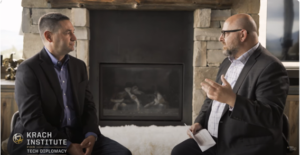HELENA – Attorney General Austin Knudsen joined Len Khodorkovsky, former U.S. Deputy Assistant Secretary of State and current senior advisor at the Krach Institute for Tech Diplomacy, to discuss Montana’s TikTok ban and the threats and dangers within the ByteDance-owned application in an interview released Thursday.
“It’s incredibly concerning when you’ve got a company like Bytedance that answers to the Chinese Communist Party and, by a lot of allegations, is actually fully controlled by the Chinese Communist Party – and that’s the company who’s behind TikTok,” Attorney General Knudsen said in the interview.

Attorney General Knudsen also covered the Chinese spy balloon that flew over much of the United States, including Montana where it was first spotted, in February and the implications for the state.
“We have several military installations here in Montana, and we have one of the nation’s nuclear missile bases here as well. We also have missile silos all over the State…” Attorney General Knudsen said. “I think China was definitely taking electronic intelligence off of a lot of our sensitive sites. It looks like they were maybe even we’re looking at a lot of our electrical infrastructure. So I think that really is what crystallized SB419 for certainly the legislature, and I think a lot of Montanans.”
To watch the full interview, click here.
About the Krach Institute for Tech Diplomacy at Purdue
The Krach Institute for Tech Diplomacy at Purdue is a “bipartisan initiative under the Purdue Research Foundation, a 501(c)(3) nonprofit affiliated with Purdue University.” “The Institute integrates technology expertise, Silicon Valley strategies, and foreign policy tools to ensure that leaders of the United States and like-minded nations are able to understand critical emerging technologies and make informed laws and policy decisions.” To learn more, click here.
###
